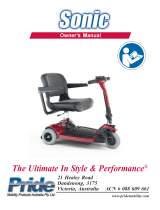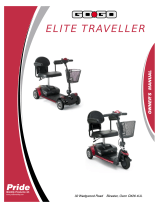
12
Maxima
www.pridemobility.com
LIFTS
Modern lifts have a door edge safety mechanism that, when pushed, reopens the lift door(s).
If you are in the doorway of a lift when the door(s) begin to close, push on the rubber door edge or
allow the rubber door edge to contact the scooter and the door will reopen.
Use care that handbags, packages, or scooter accessories do not become caught in lift doors.
NOTE: If your scooter’s turning radius is greater than 152.4 cm (60 in.), it may be difficult to maneuver
in lifts and building entrances. Use caution when attempting to turn or maneuver your scooter in small
spaces, and avoid areas that might pose a problem.
LIFT/ELEVATION PRODUCTS
If you will be transporting your scooter during travel, you may find it necessary to use a vehicle-mounted
lift system or elevation product to aid in transportation. Pride recommends that you closely review the
warnings, instructions, specifications, and safety information set forth by the manufacturer of the lift/
elevation product before using that product.
WARNING! Not all lift systems/elevation products are rated for use with an occupied
mobility device. Pride recommends that you do not remain seated in your scooter when
it is being used in connection with any type of lift system/elevation product unless:
That product is rated for occupied use by the manufacturer.
You are able to occupy your mobility device in strict conformity with the warnings,
instructions, specifications, and safety guidelines set forth by the manufacturer.
WARNING! Always turn off the power to the unit when you are being transferred via an
elevation product. Failure to do so may result in accidental throttle control lever contact,
resulting in unintended movement and personal injury or product damage.
BATTERIES
In addition to following the warnings below, be sure to comply with all other battery handling information.
MANDATORY! Battery posts, terminals, and related accessories contain lead and lead
compounds. Wear goggles and gloves when handling batteries and wash hands after
handling.
WARNING! Scooter batteries are heavy. See specifications table. If you are unable to lift
that much weight, be sure to get help. Use proper lifting techniques and avoid lifting
beyond your capacity.
WARNING! Always protect the batteries from freezing and never charge a frozen battery.
Charging a frozen battery may result in damage to the battery.
WARNING! Connect the battery harnesses in the proper manner. RED (+) cables must be
connected to positive (+) battery terminals/posts. BLACK (-) cables must be connected
to negative (-) battery terminals/posts. Protective caps should be installed over all
battery terminals. REPLACE cables immediately if damaged.
BATTERY DISPOSAL AND RECYCLING
If you encounter a damaged or cracked battery, immediately enclose it in a plastic bag and contact your
local waste disposal agency or your authorised Pride Provider for instructions on disposal and battery
recycling, which is our recommended course of action.
PREVENTING UNINTENDED MOVEMENT
WARNING! If you anticipate being seated in a stationary position for an extended period
of time, turn off the power. This will prevent unexpected motion from inadvertent throttle
control lever contact.
II. SAFETY
























